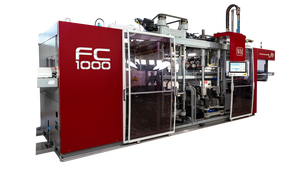São Paulo—If you want one good indicator of the size and prospects of the Brazilian injection molding machine market, here you go: there were 37 machine suppliers exhibiting at the biennial Feiplastic show (May 20-24; São Paulo), with many of those describing the sector as a rapidly expanding one.
May 29, 2013
"Brazil is a growing market," explained Hercules Piazzo, general manager of Milacron's Brazilian subsidiary in São Paulo. Milacron has been present in the country since 1997, and currently employs eight in country. To better support growth in the market, it moved into a larger 500-sq-m site seven months ago, which will maintain a show room and spare parts and machine inventory.
"The market here in Brazil is extremely high," said Rudolf Pichler, sales manager Wittmann Battenfeld, noting that it apart from a brief slow down last year, it has been expanding for the last 6-7 years, with that growth beginning anew in 2013.
"Brazil is a booming market for us," said Frank Schuster, general sales manager Sumitomo (SHI) Demag, adding that over the last six years, his company has more than doubled Brazilian machine sales.
A growing annual market
Representatives of injection molding machine suppliers exhibiting at Feiplastic pegged the annual market for new machines from a low of 1500 to a high of 3000, with most estimates settling in the 2500 to 3000 range. Of that number, the same suppliers said the number of high-end machines that can be targeted by North American and European suppliers ranges anywhere from 350 to 500 to 800. The automotive market dominates, followed by packaging.
"Since the start of this year, the market has ramped up again," Wittmann Battenfeld's Pichler said, "and it's very related to automotive." Earlier this year, the Brazilian Development Bank (BNDES) approved R$ 2.4 billion ($1.2 billion) in financing to build a new Fiat car plant, with a capacity of 250,000 units per year, in the state of Pernambuco. That plant is expected to be online in 2015.
"The Brazilian market has two main sectors: automotive and packaging," said Kai Wender, regional managing director for Arburg. The German injection molding machine supplier has had its own subsidiary in Brazil for 12 years with a staff of 15. Wender said those segments represent 60% of its business in the country.
All-electrics catching on
High utility rates and a drive for greater efficiency have been a boon for all-electric injection molding machines in the market, which are now exhibiting growth in a market where their adoption had lagged. Milacron's stand featured a Alpha Series Roboshot at the show, a machine with an installed base of around 400 in Brazil, out of a total of 700, according to Piazzo. "Roboshot is hot here," Piazzo said. "All-electric machines are the top seller in Brazil."
"The Brazilian market took a very long time to adopt all-electric machines," Wittmann Battenfeld's Pichler said. "But last year, this changed completely. Now one-third of our orders are for all-electric; the same rate as in the U.S."
Austrian machine and automation supplier Engel made energy efficiency the main focus of its stand, which featured four machines: two all electric and two hydraulic units with its ecodrive servodriven motors. "Energy is very expensive here," Udo Löhken, managing director of Engel do Brasil, said. "They have one of the highest rates in the world, and it is a very important cost factor for production."
With industrial rates approaching $0.13/kWh, Brazil's energy costs outstrip Latin American countries like Costa Rica, Colombia, Costa Rica, Uruguay, Ecuador, and Paraguay, as well as European countries like Switzerland, Sweden, and Norway. Nearly 80% of its electricity comes from hydropower.
Sumitomo (SHI) Demag's Schuster said that those energy costs can outweigh machine investment costs, which can be a barrier is a cost-conscious market. "In the end, interest in all-electric machines in Brazil comes down to many things," Schuster said, "precision, energy efficiency, premium product."
Overcoming import barriers
The success these foreign companies have comes in spite of a tax and tariff structure in Brazil that greatly incentivizes processors to buy Brazilian. Milacron's Piazzo estimates the total penalty to import, including 15% tariff and various taxes, is 40%.
For some, however, the barrier is not high enough, particular when it comes to imports from China, which have flooded the market.
"China is a problem for everyone," said Klaus Curt Müller, executive director of the Brazilian Machinery Builder's Assn. (ABIMAQ). "We have a slow process in Brazil to adapt; we need to work with our government to move faster and get more protective actions."
Brazil runs a sizable trade deficit in machinery in general and plastics in particular, posting a gap in all machinery of $14.9 billion in 2012, down from $15.0 billion in 2011; with a plastics gap of $589 million last year, down from $785 million 2011. The plastics trade balance with the U.S. has ballooned over the last four years, rising from $118.0 million in 2009 to $791.8 million in 2012, up nearly 600%.
William dos Reis, director of plastics processing machines for Brazil's largest domestic supplier of injection molding machines, Romi, said his company's main market remains Brazil, where he estimates they enjoy a market share of 25% with an installed machine base of 40,000 to 50,000. The company started making injection molding machines in the late 1960's, initially working with the former Reed-Prentice Corp. (West Springfield, MA) to transfer that technology to the Brazilian market. That partnership has ended, but dos Reis said his firm continues to augment its own technology with technology from outside, including European drives and PLCs, for instance.
"It is very difficult in Brazil," dos Reis said. "There are a lot of companies that want good technology."
At different times, foreign suppliers of injection molding machines, including the former Battenfeld which still has an installed base of 20,000 machines, have manufactured machines locally to circumvent the tariffs and duties, but none does so now.
At the show, Milacron, Chen Hsong, and Sumitomo (SHI) Demag all announced plans for a greater presence in the country, which Chen Hsong establishing its first subsidiary outside of China in Brazil and Sumitomo (SHI) Demag occupying space at a sister company's new gear box plant. The market's promise and the punitive trade duties prompted the gear box unit to build locally, and could open up that opportunity for the injection molding machine business.
"We would have room to but [at the gearbox site]," Schuster said, "but that's not the plan at this time. As long as you cannot buy machines like ours locally, we're OK. If our competitors decide to start building in Brazil, we'll have to look at it."
About the Author(s)
You May Also Like


